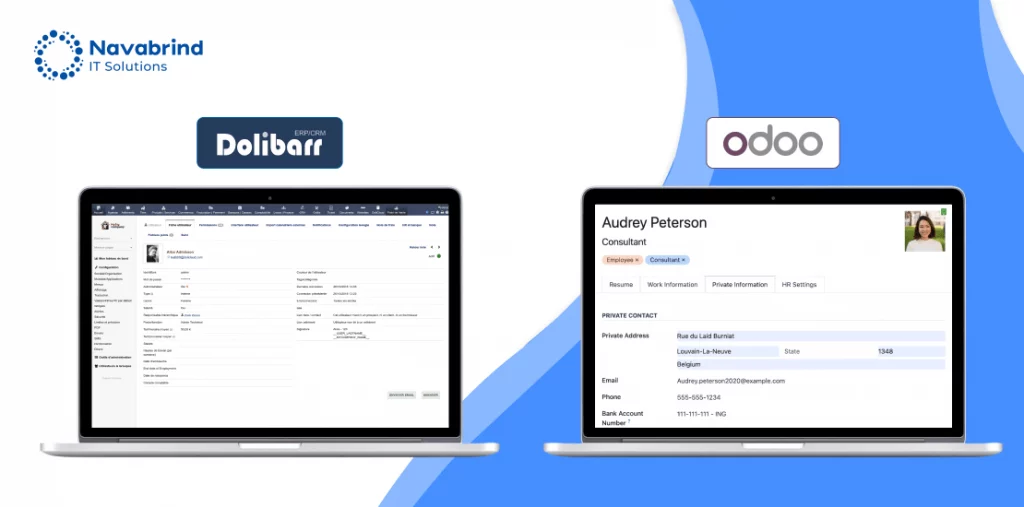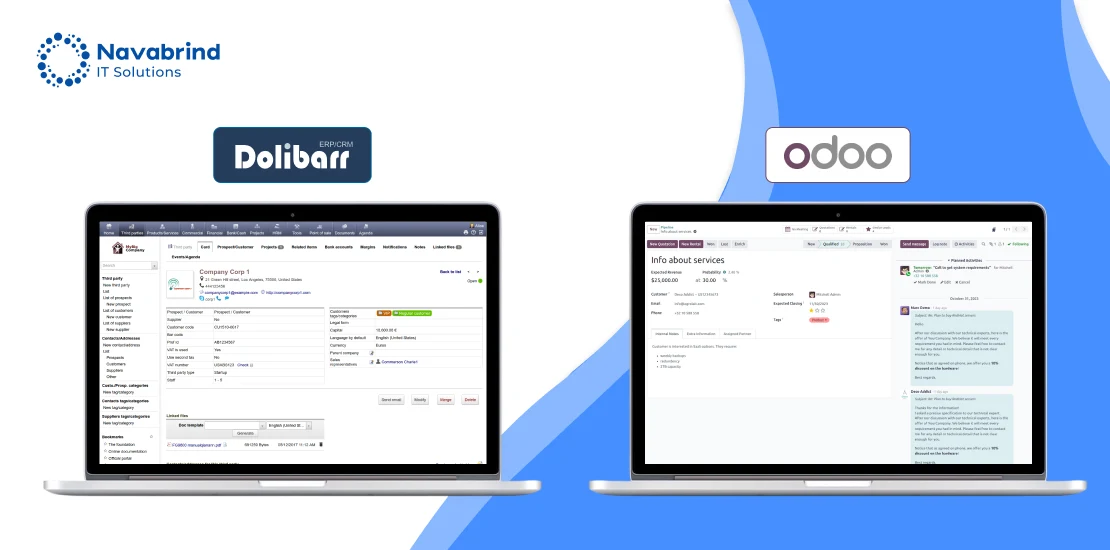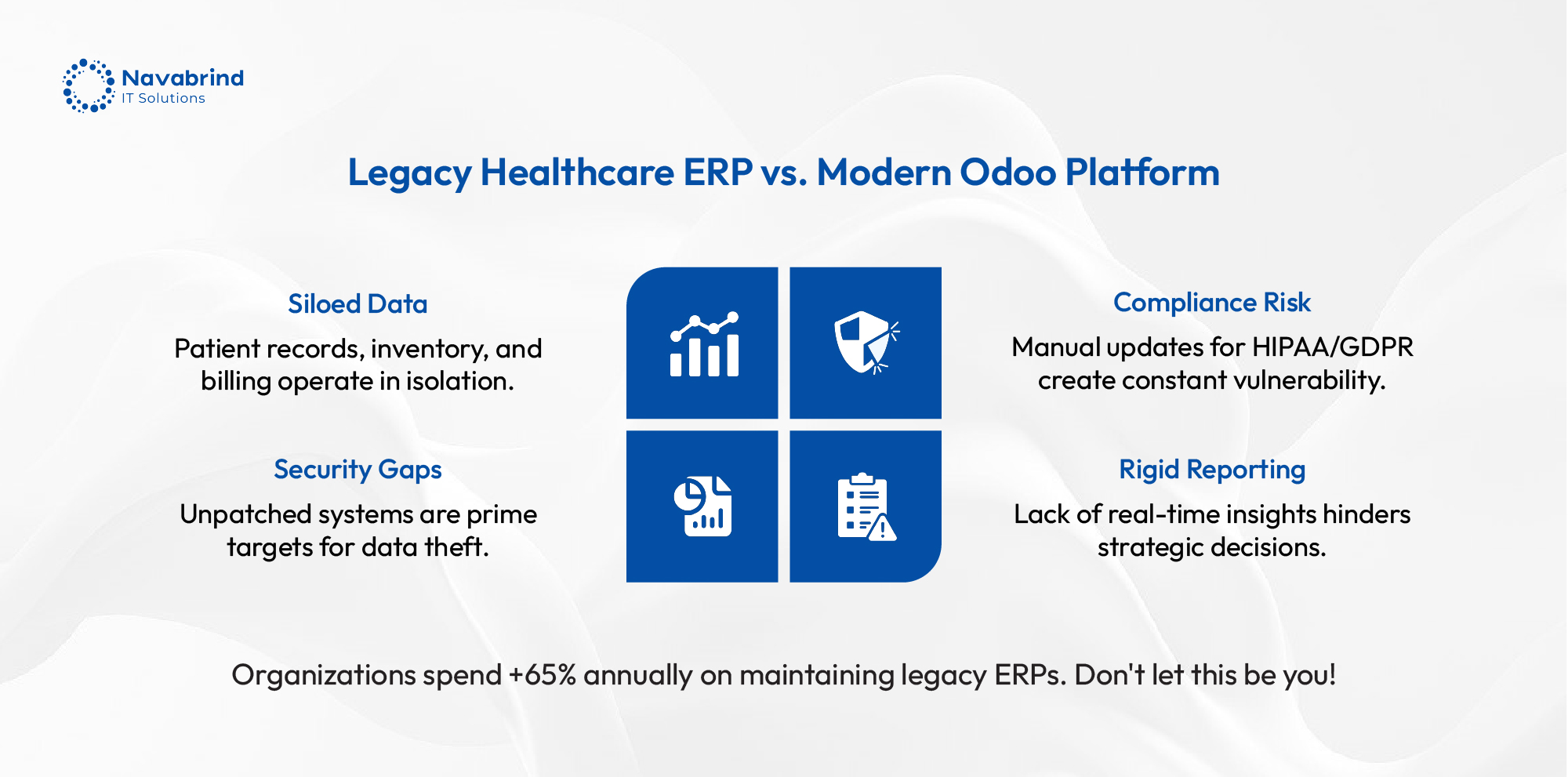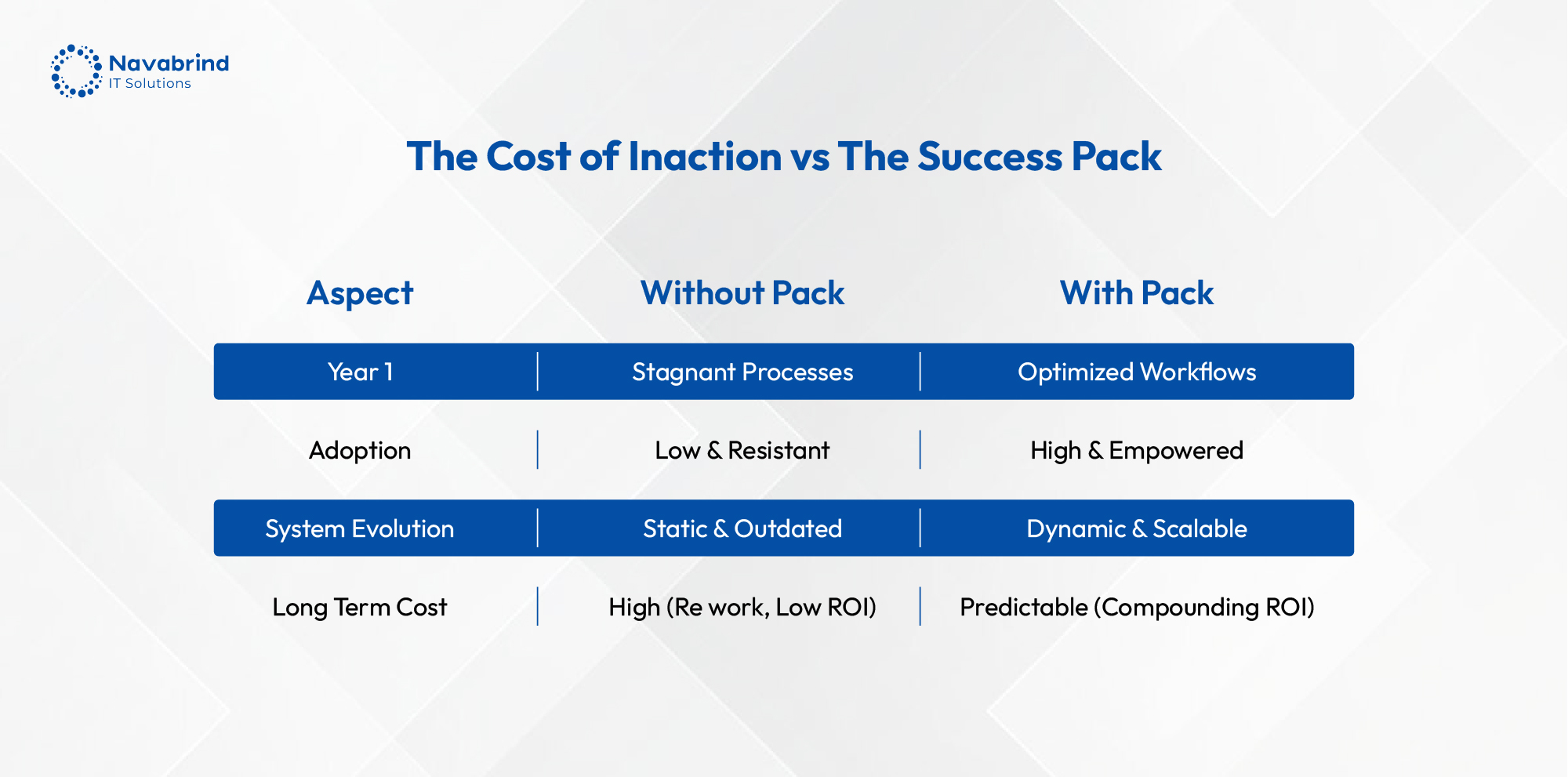Odoo vs Dolibarr: Which ERP is Best for Your Business
For small and mid-sized businesses, selecting the right ERP software is the difference between streamlined growth and operational inefficiency. An ERP centralizes key business functions—such as finance, sales, inventory, HR, and CRM—into a single system. With budget and scalability being top concerns, organizations in the USA look toward open-source ERP USA solutions that offer flexibility without the high costs of proprietary systems.
Two popular names in this space are Odoo ERP and Dolibarr ERP CRM. Both platforms are widely recognized for their affordability, and adaptability. Their strengths differ: Odoo is known for its vast modular ecosystem, support community, number of apps, and Odoo integration capabilities vs Dolibarr. Dolibarr is praised for its simplicity and straightforward setup. For businesses evaluating Odoo vs Dolibarr scalability for small business or comparing Dolibarr vs Odoo pricing US, the choice can feel overwhelming.
This blog post provides an open-source CRM ERP solutions comparison, breaking down features, pricing, scalability, and integrations. By the end, you’ll have a clear answer to the key question: Which ERP is better: Odoo or Dolibarr? Whether your priority is cost-effectiveness, scalability, or integration, this Odoo vs Dolibarr pricing comparison will help you decide the best ERP for small business USA.
Overview of Odoo ERP
What is Odoo ERP?
Odoo ERP is a leading ERP USA solution that provides a full suite of integrated business applications covering sales, finance, HR, inventory, manufacturing, marketing, and CRM. Its modular structure allows businesses to start with a few core apps and scale gradually as their needs evolve. Compared to other platforms like Dolibarr ERP CRM, Odoo is designed not only for basic process automation but also for supporting long-term digital transformation strategies.
Key Features of Odoo ERP
- Modular Design – With over 40 core apps and 30,000+ community modules, Odoo gives businesses the flexibility to choose only what they need and expand over time.
- Scalability – An advantage in the Odoo vs Dolibarr comparison for small business is its ability to support companies as they grow from a handful of employees to large enterprises.
- Integration Capabilities – Odoo integrates with e-commerce platforms, payment gateways, shipping providers, and marketing tools. When comparing Odoo’s integration capabilities to Dolibarr, Odoo stands out for its extensive ecosystem and third-party connectors.
- User Experience – Modern, intuitive interface designed for easy adoption across teams.
Popularity in the USA Market for SMEs
In the United States, Odoo has gained significant traction among small and medium-sized businesses. As organizations look for the best ERP for small business USA, Odoo is shortlisted because it combines affordability with enterprise-grade features. Dolibarr vs Odoo pricing US shows that Dolibarr can be cheaper initially, many companies find Odoo cost-effective in the long term due to its scalability and advanced functionality.
Industries Where Odoo Performs Best
Odoo’s flexibility allows it to adapt to diverse industries, including:
- Manufacturing and Distribution – Strong inventory and production planning modules.
- E-commerce and Retail – Robust sales, marketing, and omnichannel integrations.
- Healthcare and Education – Customizable workflows for service-based organizations.
- Logistics and Automotive – Streamlined supply chain and fleet management.
In an open-source CRM ERP solutions comparison, Odoo consistently ranks higher for industries that require customization and multi-department coordination, Dolibarr appeals to businesses with lighter operational needs.
Odoo vs Dolibarr in Context
When debating which ERP is better: Odoo or Dolibarr, the answer depends on company size and growth ambitions. Dolibarr works well for startups with limited requirements, Odoo is preferred by businesses planning to scale operations. This makes Odoo not only a strong choice but also a secure investment. And when it comes to cost, an Odoo vs Dolibarr pricing comparison highlights that Odoo may require a higher upfront investment but delivers better long-term ROI through advanced modules and integrations.
Overview of Dolibarr ERP CRM
What is Dolibarr ERP CRM?
Dolibarr ERP CRM is an open-source ERP USA solution designed to simplify enterprise resource planning and customer relationship management for startups and small businesses. Unlike large and platforms, Dolibarr emphasizes accessibility, making it easy to install, configure, and operate with minimal technical expertise. It provides essential ERP software functionalities—like invoicing, inventory, project management, and CRM—within a lightweight framework that appeals to cost-conscious businesses.
Simplicity and Ease of Adoption
One of Dolibarr’s strongest advantages in the Odoo vs Dolibarr debate is its simplicity. With a clean interface and straightforward setup, it allows small teams to start managing their operations quickly without heavy IT support. This ease of use makes Dolibarr attractive to entrepreneurs and microbusinesses seeking the best ERP for small business USA with minimal training requirements.
Strengths for Startups and Small Businesses
Dolibarr performs well in scenarios where businesses need:
- Basic ERP + CRM functionality without unnecessary complexity.
- Cost efficiency, since Dolibarr can be self-hosted at little to no licensing cost.
- Lightweight operations, ideal for freelancers, small agencies, and early-stage startups.
In comparison, Dolibarr appeals to those who value low entry costs and quick adoption over advanced customization. When analyzing Dolibarr vs Odoo pricing US, Dolibarr has the advantage for businesses just starting out.
Limitations Compared to Advanced Systems
Dolibarr is effective for simple use cases, its limitations become clear when compared to Odoo ERP and other advanced platforms:
- Scalability – Dolibarr can struggle as business operations become complex. In the Odoo vs Dolibarr scalability for small business discussion, Odoo offers a path for growth.
- Customization and Integration – Dolibarr supports modules and add-ons, but its ecosystem is far smaller. In terms of Odoo integration capabilities vs Dolibarr, Odoo has a significant edge with its vast marketplace and third-party connectors.
- Advanced Features – Businesses needing manufacturing automation, complex supply chain management, or omnichannel retail support may find Dolibarr lacking.
Dolibarr in the Odoo vs Dolibarr Context
For small businesses with limited budgets and straightforward needs, Dolibarr can be the right choice. When evaluating which ERP is better: Odoo or Dolibarr, companies with growth ambitions find Odoo a better fit in the long term. Dolibarr wins on affordability in an Odoo vs Dolibarr pricing comparison. Odoo balances cost with advanced scalability and integration capabilities, making it adaptable as businesses expand.
Odoo vs Dolibarr: Feature-by-Feature Comparison
When evaluating ERP software, businesses consider how well a solution addresses their current operational needs leaving room for growth. Below is a breakdown of how these two systems compare across the most critical dimensions.
1. Core Modules
- Odoo ERP: Offers a vast ecosystem of over 40 official modules and thousands of community apps. Core functionality covers Accounting, Sales, CRM, HR, Inventory, Manufacturing, Marketing Automation, Project Management, and E-commerce. Odoo’s modular approach makes it attractive for companies that want to start small and expand gradually.
- Dolibarr ERP CRM: Provides essential modules, including invoicing, sales, basic CRM, HR, stock management, and project management. Iit is sufficient for startups, its features remain limited compared to Odoo’s advanced offerings. For example, manufacturing and omnichannel retail workflows are not as robust.
In the Odoo vs Dolibarr scalability for small business debate, Odoo’s deeper and broader functionality makes it better suited for companies planning to scale, Dolibarr caters to microbusinesses and startups.
2. Customization and Flexibility
- Odoo ERP: Offers access to a vast apps marketplace with enterprise and community-developed modules. Businesses can customize workflows, dashboards, and reports extensively. This adaptability is a reason Odoo is considered among the best ERP for small business USA, especially for SMEs with evolving requirements.
- Dolibarr ERP CRM: Provides add-ons through the Dolistore, but the number of available extensions is much smaller. Customization options exist but require developer intervention, making it less flexible compared to Odoo.
For businesses requiring advanced customization, Odoo emerges as the stronger contender.
3. User Interface and Ease of Use
- Odoo ERP: Features a modern interface designed to improve user experience across devices. The intuitive dashboard and clean workflows make adoption easier for growing teams.
- Dolibarr ERP CRM: Simplicity is Dolibarr’s strength. Its interface is straightforward and requires minimal training. It feels less modern and feature-rich than Odoo’s, which may limit productivity for larger teams.
For small businesses, Dolibarr’s simplicity works well, but as needs grow, Odoo’s balance of ease-of-use and functionality delivers greater value.
4. Integration Capabilities (Odoo integration capabilities vs Dolibarr)
- Odoo ERP: Excels at integration, offering connectors with leading e-commerce platforms (Shopify, Magento, WooCommerce), payment gateways, shipping providers, and third-party apps. These Odoo integration capabilities vs Dolibarr give businesses the ability to unify multiple systems under one roof.
- Dolibarr ERP CRM: Integrations are limited, with fewer out-of-the-box connectors. Businesses need custom development to achieve the same level of connectivity that Odoo offers natively.
For companies seeking digital transformation and omnichannel strategies, Odoo offers a clear advantage.
5. Community vs Enterprise Support
- Odoo ERP: Offers a Community Edition (free, open-source) and an Enterprise Edition (paid, with advanced features and professional support). This dual offering gives businesses flexibility depending on their budget and support needs. The global Odoo community is large, active, and constantly contributing to app development.
- Dolibarr ERP CRM: Maintains an active open-source community but lacks an official enterprise edition. Support is community-driven or provided by third-party vendors. This can be cost-effective, but it is also inconsistent in quality.
In terms of professional-grade support, Odoo has the edge. Dolibarr can be appealing to companies that prioritize low costs.
Odoo vs Dolibarr: The Verdict
In a direct Odoo vs Dolibarr pricing comparison, Dolibarr wins on cost for startups, Odoo demonstrates long-term ROI through advanced features, integrations, and scalability. When asking which ERP is better: Odoo or Dolibarr, the answer largely depends on business size and growth ambitions:
- Choose Dolibarr ERP CRM if you are a small business with limited operations and need only basic functionality at minimal cost.
Choose Odoo ERP if you seek scalability, advanced customization, and integration capabilities that support long-term digital transformation.
Odoo vs Dolibarr Pricing Comparison (USA Perspective)
Pricing plays a decisive role in choosing the best ERP for small business USA, especially when comparing open source ERP USA solutions. Odoo ERP and Dolibarr ERP CRM follow different pricing approaches, and understanding these models is crucial for small and mid-sized businesses evaluating long-term costs. Below is a breakdown of how they compare.
Odoo Pricing (Community vs Enterprise in the USA)
- Odoo Community Edition: Is attractive for startups and small businesses looking to minimize upfront investment. It comes without official support and has fewer advanced features.
- Odoo Enterprise Edition: Priced per user, per month, with costs starting around $24/user/month in the USA (plus app costs). The Enterprise version includes advanced modules, mobile access, faster upgrades, and vendor-backed support.
- Hosting Costs: Odoo Online (cloud hosting) and Odoo.sh (managed cloud) add additional fees but reduce infrastructure and maintenance responsibilities.
- Value Proposition: Odoo requires higher upfront investment than Dolibarr, it offers broader scalability and integration options. For businesses comparing Dolibarr vs Odoo pricing US, Odoo’s cost is justified by its flexibility, growth readiness, and ecosystem of apps.
Dolibarr Pricing (Free + Paid Modules, Hosting Costs in the USA)
- Dolibarr ERP CRM: Free to download and use, making it one of the most cost-effective ERP software choices for small businesses and startups.
- Paid Modules & Add-ons: Additional features are available via Dolistore (the marketplace), typically priced at $10–$100 per module.
- Hosting Costs: Self-hosting is free (aside from server costs), third-party cloud providers in the USA charge between $20–$50/month depending on the package.
- Value Proposition: Dolibarr appeals to businesses with tight budgets. Costs can rise as companies add modules or require external support. Compared to Odoo ERP, Dolibarr’s ecosystem is smaller, which limits advanced capabilities and integrations.
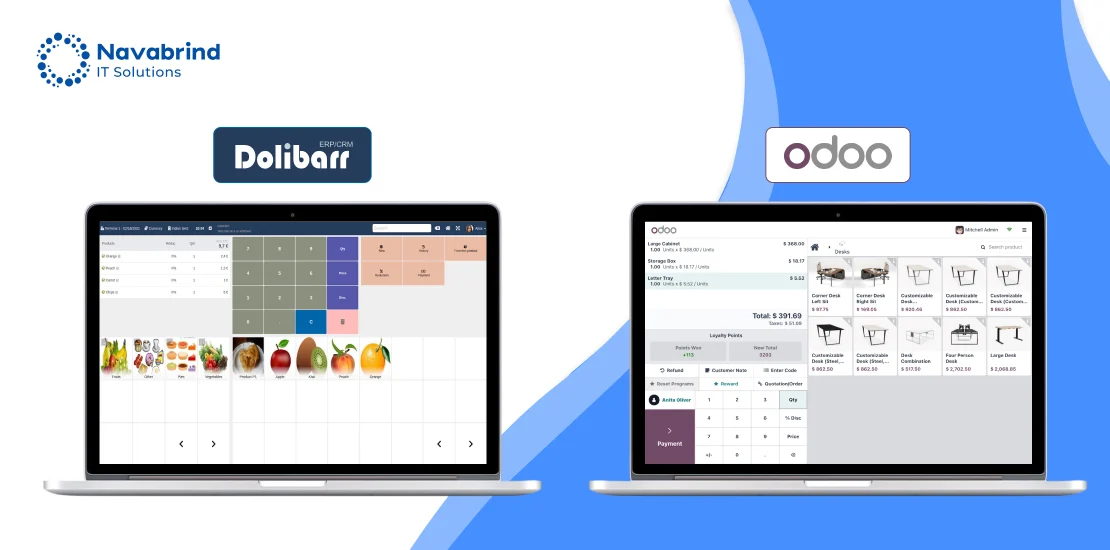
Long-Term Cost Considerations for Small Businesses
When weighing Odoo vs Dolibarr pricing comparison, the following insights help clarify the decision:
- Short-term: Dolibarr is more cost-effective for startups and microbusinesses. It’s free base and low-cost modules make it ideal for organizations that need only basic functionality.
- Long-Term: Odoo is expensive upfront, but it scales effectively. Its wide module availability and ecosystem prevent the need for multiple third-party tools. Businesses benefit from Odoo’s adaptability as they expand operations, making it a sustainable option in the Odoo vs Dolibarr scalability for small business discussion.
- Support Costs: Odoo offers official enterprise support, Dolibarr relies mainly on community or third-party vendors, which can lead to unpredictable expenses.
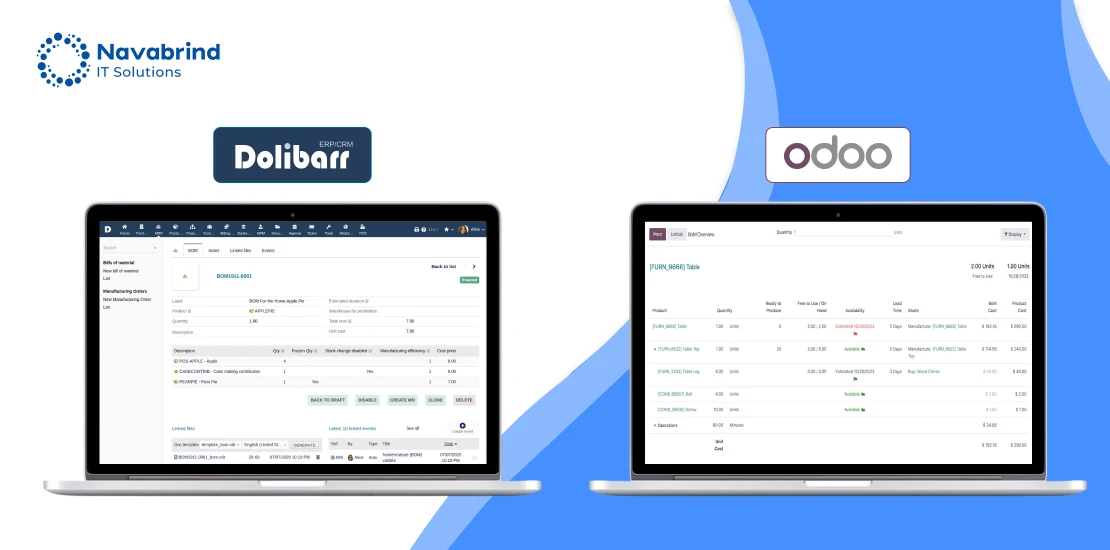
Scalability for Small Businesses: Odoo vs Dolibarr
Scalability is an essential factors small businesses in the USA must consider when selecting ERP software. Odoo ERP and Dolibarr ERP CRM are open-source ERP contenders in the USA; their ability to support long-term growth differs significantly.
How Odoo Supports Business Growth
Odoo ERP is built with scalability at its core. Its modular structure allows businesses to start with essential apps—such as accounting, sales, and inventory—and then expand into advanced areas like manufacturing, e-commerce, or marketing automation as they grow. This makes Odoo particularly well-suited to SMEs transitioning into mid-sized or enterprise-level organizations.
- Enterprise-Grade Capabilities: Odoo’s breadth of modules ensures that as businesses scale, they don’t outgrow the system.
- Integrations: With robust connectors for e-commerce platforms, payment gateways, and logistics providers, Odoo excels in integration capabilities in a Dolibarr comparison.
- Future-Readiness: Odoo’s dual offering of Community (free) and Enterprise (paid) editions ensures that small businesses can begin cost-effectively and upgrade when their needs become complex.
This adaptability positions Odoo among the best ERP for small business USA, not only for current needs but also as a system that supports long-term expansion.
Dolibarr’s Scalability Challenges
Dolibarr ERP CRM, works well for microbusinesses and small startups that need basic ERP and CRM functionality at minimal cost. Dolibarr’s lightweight design presents challenges for scalability:
- Limited Modules: Compared to Odoo’s extensive ecosystem, Dolibarr offers fewer advanced features. Businesses requiring manufacturing automation, advanced analytics, or large-scale e-commerce integration may find Dolibarr insufficient.
- Integrations: Dolibarr offers some add-ons, the ecosystem is relatively small, making it less adaptable for companies that require seamless third-party integrations.
- Growth Ceiling: In the Odoo vs Dolibarr scalability for small business discussion, Dolibarr tends to cap out at the micro-to-small business level, leaving SMEs with growing operational complexity in need of a robust platform.
Which ERP is More Future-Ready for USA SMEs?
In terms of scalability, Odoo clearly emerges as a robust solution. It provides the flexibility to support a business from its startup phase through to enterprise scale, minimizing the risk of costly system migrations later. Dolibarr wins on affordability in the short term—as highlighted in the Dolibarr vs Odoo pricing US debate—Odoo delivers better ROI over time.
In comparison, Dolibarr is suitable for businesses with simple needs and limited growth plans, Odoo’s extensive functionality ensures that SMEs won’t outgrow the system. For companies asking Which ERP is better: Odoo or Dolibarr, the answer depends on growth ambitions:
- Choose Dolibarr ERP CRM if your business will remain lean and requires only basic features.
- Choose Odoo ERP if you need a scalable and adaptable platform that supports expansion across various industries.
Ultimately, in an Odoo vs Dolibarr pricing comparison, Odoo may cost initially, but it saves businesses from switching systems as they scale—making it the stronger long-term choice for USA SMEs.
Which ERP is Better: Odoo or Dolibarr?
Choosing the right ERP can significantly impact how efficiently your business grows. Here’s a breakdown to help you decide.
When to Choose Dolibarr ERP CRM
Dolibarr is often considered the best ERP for small business USA when simplicity and cost are top priorities. It’s a lightweight CRM ERP system that works well for:
- Small startups with limited budgets.
- Businesses needing basic ERP and CRM functions without extensive customization.
- Companies seeking quick deployment with minimal IT overhead.
If you’re evaluating Dolibarr vs Odoo pricing US, Dolibarr usually has lower upfront and ongoing costs, making it an option for small teams. Scalability is limited compared to Odoo.
When to Choose Odoo ERP
Odoo is a fast growing ERP USA platforms and is designed for businesses looking beyond the basics. It’s the better choice when:
- You need scalable ERP software that grows with your business.
- Customization and advanced workflows are critical.
- Long-term digital transformation and automation are part of your roadmap.
- You require extensive third-party Odoo integration capabilities vs Dolibarr, covering e-commerce, supply chain, HR, and.
Odoo may be expensive than Dolibarr in the Odoo vs Dolibarr pricing comparison; it offers far greater flexibility, modularity, and industry-specific solutions.
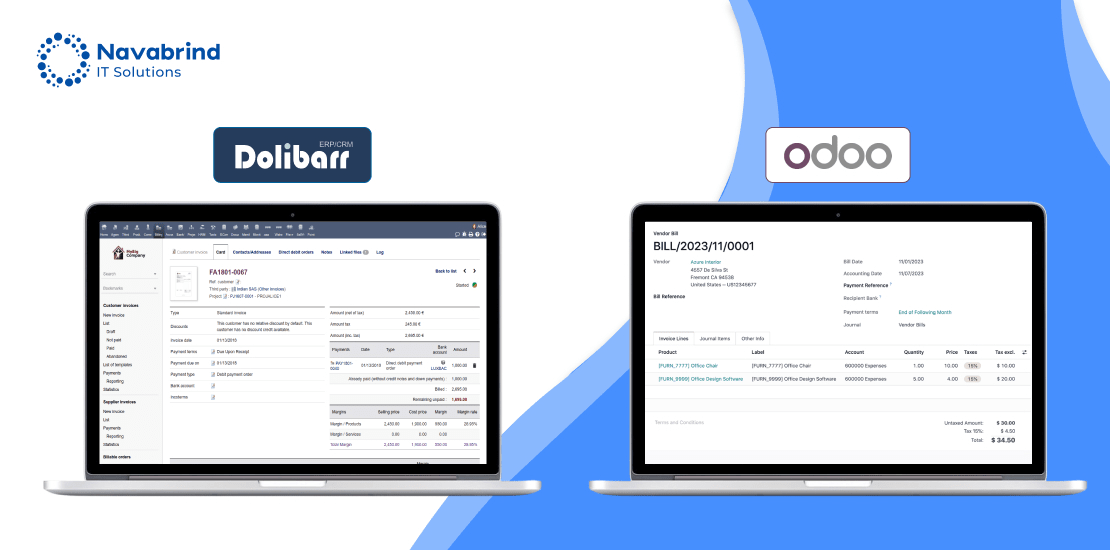
Decision Matrix: Business Size, Complexity, and Budget
- Small Startups / Budget-Conscious Teams → Choose Dolibarr ERP CRM for simplicity and affordability.
- Growing SMEs with Complex Processes → Choose Odoo ERP for scalability and long-term adaptability.
- Enterprises with Integration Needs → Odoo provides a comprehensive ecosystem of apps, positioning it as a top choice in ERP solutions comparisons.
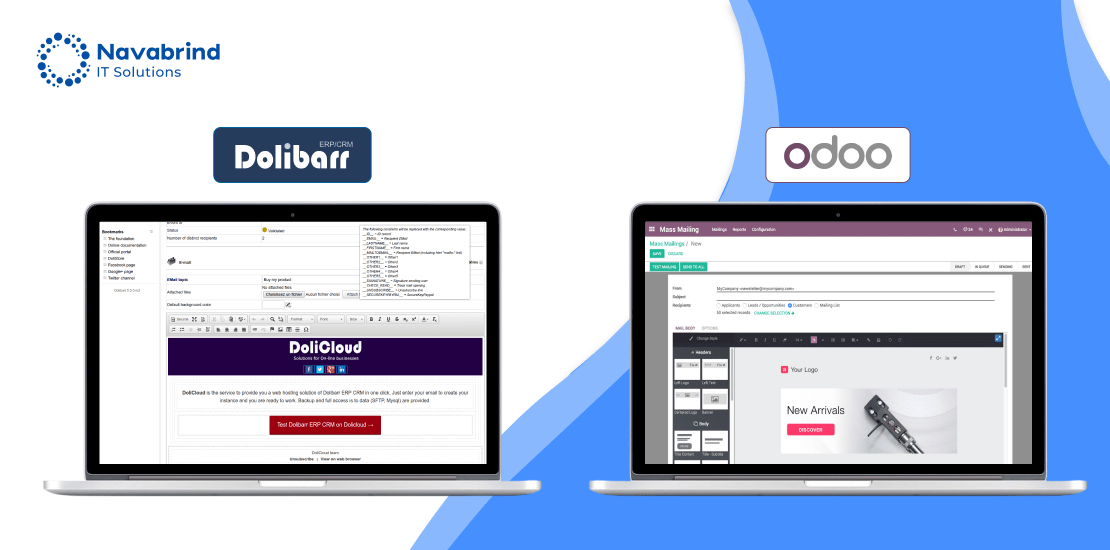
Odoo vs Dolibarr: Final Comparison
The key difference lies in scalability and long-term growth.
- Dolibarr ERP CRM is best suited for lean startups and budget-conscious teams. It offers straightforward ERP software and open-source CRM ERP features, making it the best ERP for small business USA that needs quick setup and low costs. In the Dolibarr vs Odoo pricing US debate, Dolibarr comes out cheaper but with limited scalability.
- Odoo ERP, on the other hand, is built for growing and scaling businesses. Its modular structure, advanced customization, and extensive Odoo integration capabilities vs Dolibarr make it the better choice for companies planning long-term expansion. Odoo can be expensive in the Odoo vs Dolibarr pricing comparison, the investment pays off with flexibility and adaptability.
In short, the answer to “Which ERP is better: Odoo or Dolibarr?” depends on business goals. For lean startups, Dolibarr is cost-effective and simple. For scaling businesses in the USA, Odoo stands out as the superior platform, offering unmatched Odoo vs Dolibarr scalability for small business and long-term digital growth potential.
Frequently Asked Questions
1. What are the main differences between Odoo and Dolibarr in terms of features and functionality?
The difference in the Odoo vs Dolibarr debate lies in the depth and breadth of their ERP software capabilities. Odoo ERP offers a modular system with over thousands of applications and community-developed modules, covering a wide range of functionalities, including advanced accounting, CRM, HR, and inventory management, as well as e-commerce, manufacturing, and marketing automation. This makes Odoo a open source ERP USA solutions available, with the ability to scale from small startups to large enterprises. Its integration capabilities allow data flow across modules, which is critical for businesses with large operations or plans for long-term growth.
In contrast, Dolibarr ERP CRM focuses on simplicity and ease of use, making it an attractive option for micro and small businesses that only require basic ERP and CRM functions, such as invoicing, contacts, and project management. It does offer additional add-ons, but the ecosystem is not as mature or extensive as Odoo’s. In comparison, Odoo clearly wins in customization, scalability, and advanced functionality. In contrast, Dolibarr is better suited for lean businesses that prioritize straightforward, budget-friendly tools. For companies asking which ERP is better: Odoo or Dolibarr, the answer depends on their operational complexity, Odoo is the feature-rich choice, Dolibarr is ideal for businesses with minimal requirements.
2. How do Odoo vs Dolibarr compare in pricing (in the USA or globally)?
When comparing pricing between Odoo and Dolibarr, the two solutions have distinctly different models. Odoo ERP is available in two editions: the free Community edition, which is suitable for businesses comfortable with self-hosting and limited support, and the Enterprise edition, which includes advanced features, professional support, and hosting options. In the USA market, Odoo Enterprise pricing is per user per month plus module costs, making it expensive than Dolibarr upfront. The value lies in its extensive features and the ability to integrate everything into one platform, reducing the need for multiple software subscriptions in the long run.
Dolibarr ERP CRM is open-source and free to download, with costs associated with optional paid add-ons, hosting, or third-party support services. This makes Dolibarr one of the best ERP for small business USA options for startups or budget-conscious companies. As businesses grow, Dolibarr’s limited scalability may lead to additional expenses in migrating to a robust solution like Odoo. From a Dolibarr vs Odoo pricing US perspective, Dolibarr is cheaper in the short term, but Odoo is cost-effective in the long run because of its scalability, integrations, and ability to centralize business operations. For SMEs considering Odoo vs Dolibarr scalability for small business, Odoo tends to be the future-ready investment.
3. Which is more scalable for small businesses / growing companies?
When comparing Odoo vs Dolibarr in terms of scalability, Odoo ERP stands out as the better and future-proof platform. Its modular design allows businesses to start small—implementing just a few apps—and expand into advanced areas, such as manufacturing, e-commerce, or multi-company management, as they grow. This flexibility makes Odoo one of the best ERP for small business USA, especially those that anticipate growth in users, transactions, or geographic reach. With robust cloud hosting and enterprise-grade support, Odoo transitions from small to medium-sized companies and beyond, ensuring that scaling operations does not require changing ERP systems.
In contrast, Dolibarr ERP CRM is well-suited for micro and small businesses that require only basic functionality in accounting, CRM, invoicing, and project management. When it comes to Odoo vs Dolibarr scalability for small business, Dolibarr struggles to support complex operations due to limited module depth and fewer enterprise-ready features. Businesses may find Dolibarr suitable for the short term, but as they grow, they face challenges integrating sophisticated workflows or handling high transaction volumes. For companies asking Which ERP is better: Odoo or Dolibarr, Odoo clearly offers a great foundation for long-term growth.
4. How good are the integration capabilities of Odoo compared to Dolibarr?
Integration is a differentiator in the open-source CRM ERP solutions comparison. Odoo integration capabilities vs Dolibarr show a clear gap: Odoo has a large ecosystem of pre-built connectors and APIs that integrate with payment gateways, shipping providers, e-commerce platforms like Shopify and Magento, marketing tools, and third-party applications. Its ERP software is designed to centralize operations, making it easier for businesses to eliminate silos and work with real-time data across departments. This is particularly valuable for SMEs in the USA that rely on multiple tools to manage their operations and want a single source of truth.
On the other hand, Dolibarr ERP CRM offers basic integration options, but its ecosystem is not as broad or mature as Odoo’s. Dolibarr does have community-developed add-ons, they lack the depth, stability, or enterprise-level reliability that growing businesses require. For small teams with simple needs, Dolibarr’s integrations may be enough, but in an Odoo vs Dolibarr pricing comparison, Odoo’s higher cost is justified by its superior integration capabilities. For SMEs looking for the best ERP for small business USA that supports connectivity, automation, and growth, Odoo provides a much better integration framework than Dolibarr.
5. How good are the integration capabilities of Odoo compared to Dolibarr?
In the Odoo vs Dolibarr debate, integration capabilities are one of the areas where Odoo ERP clearly outshines Dolibarr. Odoo has an extensive ecosystem of native modules and third-party apps that allow connections with e-commerce platforms, payment gateways, shipping providers, marketing automation tools, and external business applications. This level of interoperability is critical for SMEs that need a unified system to manage multiple workflows. For businesses in the USA seeking an open-source ERP USA solution with strong connectivity, Odoo ensures that data flows smoothly across departments, reducing duplication and enabling real-time insights. This makes it one of the best ERP for small business USA options when integration is a priority.
By contrast, Dolibarr ERP CRM offers fewer integration options, relying mainly on community add-ons or external customization. It is sufficient for basic ERP + CRM needs, its ecosystem is less mature, which can create challenges when connecting to advanced third-party systems. In an open-source CRM ERP solutions comparison, Odoo integration capabilities vs Dolibarr shows that Odoo provides a reliable and enterprise-ready framework. Dolibarr may be cost-effective in the Dolibarr vs Odoo pricing US context, companies that need scalable integrations to support growth will find Odoo to be the better long-term investment.
6. Which ERP is better suited for my business: Odoo or Dolibarr?
The answer to “Which ERP is better: Odoo or Dolibarr?” depends on the size and goals of your business. If you are a lean startup or a small company with straightforward requirements—such as invoicing, contact management, or basic CRM—then Dolibarr ERP CRM can be a cost-effective choice. Its simplicity and ease of adoption make it attractive to entrepreneurs who want a quick setup without investing heavily in customization. In the Odoo vs Dolibarr pricing comparison, Dolibarr comes out cheaper, especially for micro-businesses that are budget-conscious and only need essential functionality.
For growing SMEs or businesses planning for long-term digital transformation, Odoo ERP is generally the better choice. It offers a broader feature set, stronger Odoo integration capabilities vs Dolibarr, and robust scalability, making it the best ERP for small business USA that anticipates expansion. Odoo may require higher initial investment—especially with Enterprise edition costs in the Dolibarr vs Odoo pricing US context—it prevents the need for costly migrations later as your operations become complex. Ultimately, when evaluating Odoo vs Dolibarr scalability for small business, Odoo is future-proof, Dolibarr works best as a lightweight solution for startups with limited needs.
Schedule a conversation with us now!
Related Articles
-
Post
From Legacy Healthcare ERP to Odoo ERP: Why You Need Expert Odoo Migration Help
From Legacy Healthcare ERP to Odoo ERP: Why You Need Expert Odoo Migration Help February 11, 2026 Posted by: Tony Category: Uncategorized No Comments Why Healthcare Organizations Need Odoo ERP Migration Legacy healthcare ERP systems create barriers to efficiency. They are expensive to maintain, and struggle to integrate tools. This disconnect impacts patient care coordination, -
Post
From LLMs to Agentic AI: A Practical Guide to What They Mean and How to Choose
From LLMs to Agentic AI: A Practical Guide to What They Mean and How to Choose February 4, 2026 Posted by: Tony Categories: Artificial Intelligence, Blog No Comments As definitions, use cases, expectations, and investments around Large Language Models (LLMs), Retrieval-Augmented Generation (RAG), AI agents, and agentic AI continue to expand, many individuals and organizations -
Post
Beyond Go-Live: How Your Odoo Success Pack Drives Real, Long-Term ROI
Beyond Go-Live: How Your Odoo Success Pack Drives Real, Long-Term ROI February 3, 2026 Posted by: Category: Uncategorized No Comments The Implementation Myth Businesses mistakenly measure ERP success by completing the implementation phase while the actual measure of value is the operational transformation unlocked after go-live. The Odoo Success Pack is the framework engineered to
How can we help you?
Get in touch with a solutions consultant that can share best practices and help solve specific challenges.





